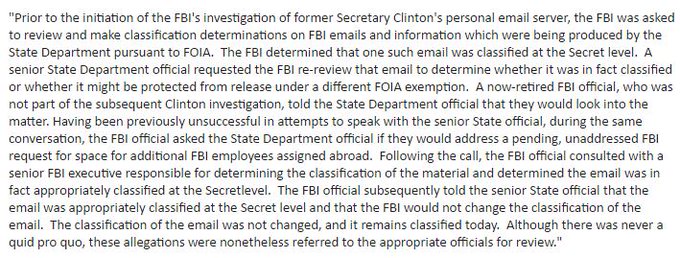For the past few months, Hillary Clinton's decision to exclusively use a private email server while at the State Department has receded as a campaign issue as Donald Trump's comments about women have come to dominate the daily chatter about the 2016 race.
On Monday, however, the various issues associated with Clinton's email setup came roaring back. According to emails released by the FBI, Undersecretary of State Patrick Kennedy asked the FBI to ease up on classification decisions in exchange for allowing more FBI agents in countries where they were not permitted to go. The words "quid pro quo" were used to describe the proposed exchange by the FBI official. (The State Department insists it was no such thing; "This allegation is inaccurate and does not align with the facts," said State Department deputy spokesman Mark Toner in a statement. "To be clear: the State Department did upgrade the document at the request of the FBI when we released it back in May 2015.")
Dust up between State Department, FBI over classificationpic.twitter.com/AHnggvyMkE
Oh, boy. Quid pro quo allegation between State and FBI over classification. That is messy. pic.twitter.com/Kf5FcSFQjb
The FBI responded that the classification specialist with whom Kennedy made this request was not part of the investigation into Clinton's emails and is now retired.
The Clinton campaign will, as it has done every time there is any news about whether she sent or received classified material on her private server, chalk this up to an interagency dispute over classification. Typical bureaucratic mumbo-jumbo, they will say. This sort of stuff happens all the time!
FBI Director James Comey testified on July 7 at a U.S. House of Representatives hearing on presumptive Democratic presidential nominee Hillary Clinton's decision to use a personal email server while serving as Secretary of State. (Peter Stevenson/The Washington Post)
Except, not really. First of all, we already know from FBI Director James B. Comey that Clinton sent and received emails and information that was classified at the time. ("110 e-mails in 52 e-mail chains have been determined by the owning agency to contain classified information at the time they were sent or received," Comey said in his remarkable press conference on the FBI investigation.) Clinton's explanation has now evolved to this: She didn't know documents marked with a "c" meant they were confidential (and therefore classified) and, therefore, she never knowingly sent or received classified material — with the emphasis on "knowingly."
That's a tough position to hold in light of Kennedy's attempted quid pro quo, which suggests that at least some people at State were actively trying to fiddle with classification determinations made by the FBI.
It's hard to square the idea of Kennedy offering a quid pro quo to the FBI regarding a classification decision and Clinton not even knowing that "c" on documents stands for "classified." One suggests deep understanding of how the classification process works. The other, um, doesn't.
Now, simply because Kennedy asked for a quid pro quo regarding classification doesn't mean that Clinton asked him to do so. There's no evidence of that. There's also no evidence that Clinton had a conversation of any sort with Kennedy about his classification request. And it's important to remember that Kennedy is a career officer at State, having worked in the same administrative job for Condoleezza Rice prior to Clinton, so he's not exactly a partisan.
That said, this latest revelation adds more evidence to the "where there's smoke, there's fire" argument that Republicans have long made about Clinton's email setup. The idea of setting up a quid pro quo when it comes to classifications of information will, for many people, confirm their suspicions that the government bureaucracy is simply protecting Clinton. If a State Department official is offering a quid pro quo in this one exchange, can you imagine what they are doing off the books?
Speaker Paul Ryan's statement speaks directly to that suspicion. “A senior State Department official’s attempt to pressure the FBI to hide the extent of this mishandling bears all the signs of a cover-up," Ryan said. "This is why our aggressive oversight work in the House is so important, and it will continue.”





No comments:
Post a Comment